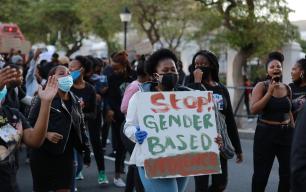Namcor corruption probe deepens

• By Patience Makwele
The National Petroleum Corporation of Namibia (Namcor) corruption scandal took a dramatic turn yesterday, with the Anti-Corruption Commission (ACC) formally charging 13 individuals.
Among those appearing in court was former Namcor Managing Director Immanuel Mulunga, marking a critical juncture in an investigation that continues to unravel alleged deep-seated irregularities and financial malfeasance within the state-owned oil company.
The widening net of accusations now includes racketeering and money laundering, and goes beyond individual wrongdoing, laying bare what many observers see as systemic governance rot pervading Namibia's vital state-owned enterprises (SOEs). The extensive charges are severe, falling under both the Anti-Corruption Act and the Prevention of Organised Crime Act. They include a litany of serious offenses such as corruptly accepting gratification, using official positions for personal gain, and conspiracy to commit corruption. Crucially, the ACC has now introduced complex financial crimes, notably racketeering, money laundering, and using false documents to disguise illicit activities. This indicates a strategic shift by the ACC, suggesting they are pursuing a sophisticated network of alleged criminal conduct designed to extract and conceal illicit gains from public coffers.
ACC Director General Paulus Noa warned that this is not the end of the investigation. "More charges and arrests are anticipated as investigations continue to unravel the full extent of the alleged illicit network," Noa confirmed. His statements underscore the ACC's determination to cast a wide net, regardless of the individual's current or former association with Namcor. "We don't care, as long as someone is implicated in money laundering and corruption, we just have to round them up. We don't care if they work for Namcor or not as long as you are implicated, we will deal with you," Noa stated, signalling an uncompromising approach.
The arrest of Mulunga, particularly, carried a potent layer of irony. Just two years ago, the very same ACC had reportedly cleared him of criminal intent over a N$100 million payment not approved by the Namcor Board. The dramatic reversal of fortunes, highlighted in local media, raised pressing questions about new evidence emerging or a fresh perspective on prior findings, bringing the ACC's own processes and the broader oversight mechanisms into sharper focus.
Mulunga, whose tenure at Namcor ended on unsavoury terms in August 2024, has been previously fingered in the fraudulent sale of oil storage facilities to Namcor, which allegedly already belonged to the Ministry of Defence, as well as other governance lapses such as the over-extension of credit facilities. These previous allegations now appear to form part of a much larger, interconnected web of alleged criminality.
Namcor recently revealed its precarious financial state, reporting a staggering net loss exceeding N$1.2 billion for the 2022/23 financial year. The company openly acknowledged serious governance lapses, non-compliance with policies, and operational system challenges, including inadequate internal controls, system overrides, stock theft, trading losses, and potential reckless trading. These candid admissions highlight the systemic problems now being uncovered by the Anti-Corruption Commission (ACC). Recent reports point to controversial transactions, such as a N$53 million payment to military contractor Enercon for a deal that never materialized, and a N$123 million payment to Sungara Energies, allegedly authorized by former managing director Immanuel Mulunga without full board approval. Adding to the crisis, companies like Erongo Petroleum reportedly owe Namcor N$238 million, far exceeding their initial credit limit of N$3 million, yet have not made any payments.
The unfolding drama comes at a particularly sensitive time for Namibia. With vast oil discoveries in the Orange Basin promising to transform the nation's economic landscape, the integrity and transparency of key institutions like Namcor are under intense global scrutiny. Multiple studies and reports, including those by the IPPR and various academic institutions, have consistently highlighted the weak state of corporate governance within Namibian SOEs.
- 480 views










Comments